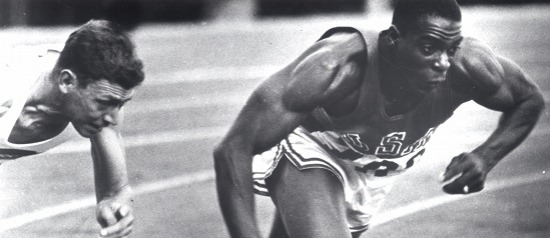
Tokyo Olympiad. Courtesy of Janus Films
SERIES
'Scope Docs: The Wild World in Widescreen
November 1–3, 2019
CinemaScope was embraced by Hollywood in the 1950s as a response to television’s early success: By doubling the width of the screen, the hope went, the theatrical experience would regain its allure and its audience. The first generation of documentarians to employ CinemaScope were a part of this movement, fighting for a heightened theatrical experience. This program organized by documentary filmmaker Jason Kohn was inspired by his own process of discovery while shooting his first film Manda Bala. Kohn introduces the series:
“In 2001, I set off to direct my first film Manda Bala (Send a Bullet). I wanted to make a nonfiction film about political corruption and violence in the style of Robocop, shot on film with anamorphic lenses. These choices made my production immensely more difficult, but they were born from an argument I still hold with conviction: Documentary is simply another genre within cinema, rather than a separate form of storytelling. Naively, I thought my film would be the first ever CinemaScope documentary. I assumed that CinemaScope had been the exclusive purview of studio pictures, a luxury most independent filmmakers couldn’t afford due to the format’s expensive, bulky lenses and post-production requirements. The technical complexity of the process was far removed from what I knew of nonfiction filmmaking, defined by light, sync-sound cameras, and the véritémovement of the 1960s. When I discovered, shockingly late into my own production, that other anamorphic nonfiction existed, it was a revelation. The first works I came across—Tokyo Olympiad, Africa Addio, and Blue Water, White Death—were not only incredible visual experiences, but also expertly crafted works of art. I considered the films the ‘Holy Trinity’ of nonfiction cinema and I aspired to join this small, exclusive club. My hubris and ignorance continued for many years, but over time I amassed a list of other films shot in ‘Scope—French travelogues, American surf spectacles. Each discovery felt like a new chapter in my own detective story.
“Today, when we are allegedly living through a golden age of documentary filmmaking, we stand to learn much by studying these works and trying to understand the choices of their filmmakers. Why, despite all financial and technical obstacles, did these documentarians work in CinemaScope? How did it impact not only their craft, but the experience of their cinema? Ultimately, what makes the films in this series special is not the technology used, but how it enabled personal visions to print and expand on the large screen."—Jason Kohn
Organized by Jason Kohn, with assistance by Curator of Film Eric Hynes and Assistant Curator of Film Edo Choi
Plan to see all the films? Consider a $40 series pass good for admission to all seven screenings.
 Screening & Live Event
Screening & Live EventTokyo Olympiad
Friday, November 1, 7:00 p.m. Museum of the Moving Image - Redstone Theater
 Screening & Live Event
Screening & Live EventFive Provincial Scenes by Vittorio De Seta
Saturday, November 2 - Sunday, November 3, 2:00 p.m. Museum of the Moving Image - Redstone Theater
 Screening & Live Event
Screening & Live EventThe Man Who Skied Down Everest
Saturday, November 2, 4:00 p.m. Museum of the Moving Image - Redstone Theater
 Screening & Live Event
Screening & Live EventGo Go Mania
Sunday, November 3, 1:30 p.m. Museum of the Moving Image - Redstone Theater
 Screening & Live Event
Screening & Live EventBlue Water, White Death
Sunday, November 3, 3:00 p.m. Museum of the Moving Image - Redstone Theater
 Screening & Live Event
Screening & Live EventManda Bala (Send a Bullet)
Sunday, November 3, 5:00 p.m. Museum of the Moving Image - Redstone Theater
 Screening & Live Event
Screening & Live EventAfrica Addio
Sunday, November 3, 7:00 p.m. Museum of the Moving Image - Redstone Theater

